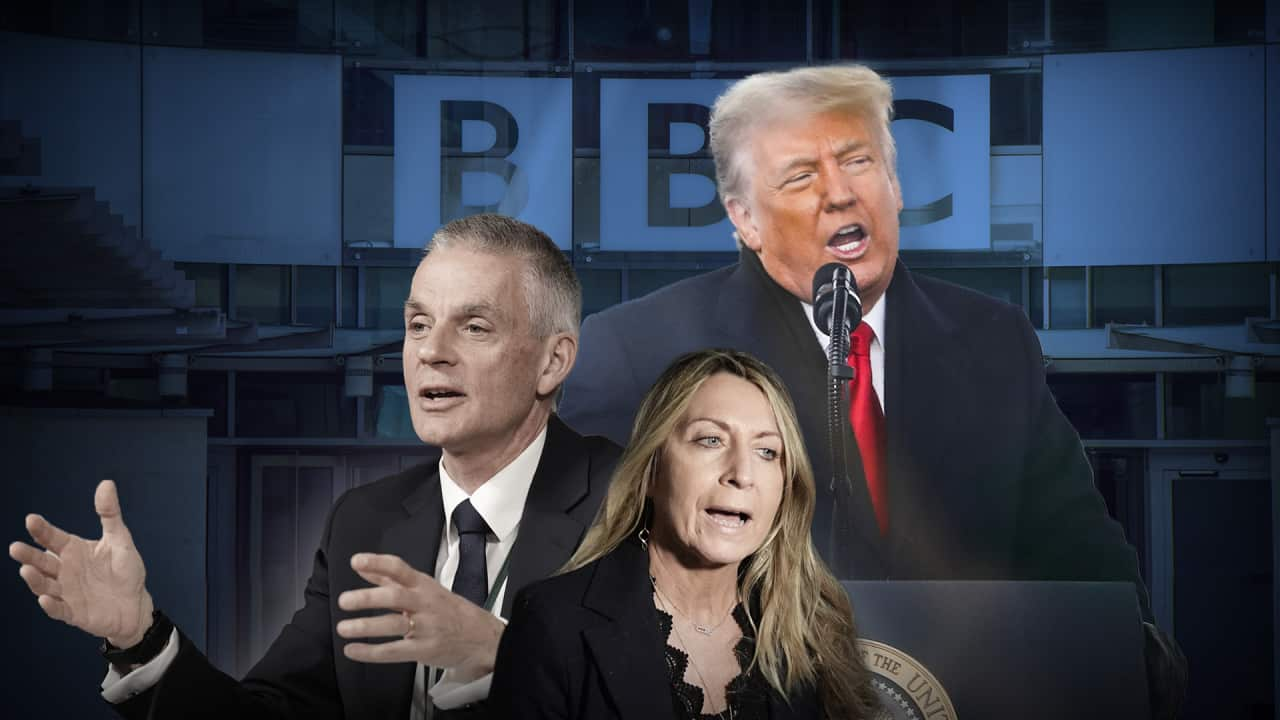One of the most trusted news brands in the world is now in the grip of a reputational crisis — and US President Donald Trump is at the centre.
In the space of a week, the BBC has lost two of its most senior officials, is fielding attacks about media bias, and now potentially facing a $1.5 billion lawsuit from the most powerful man in the world.
The British broadcaster is now in the uncomfortable position of reporting on itself as the attacks from the conservative media and the White House keep coming.
The saga began with a memo.
What did the leaked memo say?
The BBC has been under mounting pressure after an internal report cited failings in its coverage of topics including Trump's speech before the January 6 storming of the US Capitol, the BBC Arabic's Gaza coverage, and transgender issues.
The memo, written by independent external adviser Michael Prescott to the editorial standards committee, was leaked last week to London's Daily Telegraph newspaper.
While the memo raised also concerns about coverage of racism and immigration issues, it was a 10-second clip of Trump broadcast on the flagship Panorama show that caused heads to roll at the top of the BBC.
The episode, "Trump: A Second Chance?" was broadcast a week before the US presidential election in November 2024. Prescott said it "seemed to be taking a distinctly anti-Trump stance".
What was the edited clip at the centre of the BBC scandal?
The 12-second clip spliced two separate Trump quotes together from a speech he delivered on January 6 to his supporters.
In the Panorama clip, Trump is heard saying: "We're going to walk down to the Capitol ... and I'll be there with you. And we fight. We fight like hell."
His actual quote was: "We're going to walk down to the Capitol, and we're going to cheer on our brave senators and congressmen and women."
The quotes were originally delivered 50 minutes apart.
Trump spoke at the Ellipse park near the White House on January 6 while the results of the 2020 presidential election were being certified. Trump urged his supporters to march on the Capitol.
Throughout his speech, Trump repeatedly used the word "fight".
"We fight like hell and if you don't fight like hell, you're not going to have a country anymore," he said.
"So, we're going to walk down to Pennsylvania Avenue ... and we're going to the Capitol and we're going to try and give ... our Republicans ... the kind of pride and boldness that they need to take back our country."
While Trump's legal team have consistently sought to emphasise a part of the speech in which he urged supporters to "peacefully and patriotically make your voices heard", the select January 6 committee in 2022 said there was enough evidence to convict and charge Trump with "assisting, aiding or comforting" the attack.
The BBC's director general Tim Davie and head of news Deborah Turness both quit this week following the criticisms of the documentary edit.
Celebrating the resignations, Trump accused BBC journalists of being corrupt and dishonest.
What now for the BBC?
The BBC's funding model, a $352 licence fee on households — long under conservative political pressure — is now under renewed scrutiny at a time when it's about to undergo a review.
The government has committed to upholding the licence fee until the end of the BBC's Charter period, which expires in 2027.

Reform UK MP Nigel Farage said "millions" of Britons were refusing to pay the fee.
"If the BBC doesn't now get a grip, get somebody in from the outside. Somebody who has got a history and a culture of changing organisations, of turning them around, then I think what you would see within the next couple of years are many, many millions just refusing, just not wanting to have the license fee," he said.
The BBC is now looking for a new director general following the shock resignation of Davie, whose parting note acknowledged "some mistakes made" and that as the boss, he had "to take ultimate responsibility".
It is also looking for a fresh head of news — with the departure of Turness, who acknowledged the Trump video edit as a factor in her resignation. Turness though, rejected accusations that BBC News is institutionally biased.

But it's not been enough for Trump, who's called for more than just heads. He is now threatening to sue the broadcaster if it fails by 14 November to retract the documentary, apologise and "appropriately compensate" the president for what they claim is "the harm caused".
Trump's lawyers say they will have no option but to file legal action for no less than US$1 billion ($1.5 billion).
A 12-second clip could now cost the BBC — which a Reuters report this year found is among the most trusted news brands in the United Kingdom — more than just its reputation.
For the latest from SBS News, download our app and subscribe to our newsletter.

